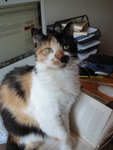Links - Nuruddin Farah
 Title: Links
Title: Links
Author: Nuruddin Farah
Country: Somalia
Year: 2004
Rating: 4 out of 5
Pages: 336
First sentence: "Guns lack the body of human truths!"
It has been 15 years since the Somali state collapsed, when the dictator Said Barre fled Mogadishu in 1991, and Somalia continues to remain a failed state, with no effective government. Continuing to be neglected or ignored by the international community, Somalia has no rule of law or justice system, and very little of its infrastructure remains functioning or intact. As recently as 2006, active warfare broke out between the warlords and militia, with the backing of Ethiopia. This is the setting in which Links takes place, Mogadishu of the mid-1990's. Unfortunately not very different from the Mogadishu of today.
Jeebleh arrives in a Mogadishu vastly different from the one he left twenty years ago. On landing at an airport now under the control of a warlord, Af-Laawe, a man unknown to him that was sent by someone unknown to pick him up, greets Jeebleh with 'Guns lack the body of human truths!' At his hotel, when asking to make an international phone call, he is visited by a one-man phone operator that carries a satellite phone in his bag. Jeebleh does not know what to make of his devastated city, nor how to understand those who live in it. He arrives in Mogadishu with the goal of finding his mother's grave, and finding his friend Bile's niece, who has been abducted. Through Jeebleh's self-righteousness, parallel to the American military intervention, Farah asks the question of how does a person be good and just in a city that is a murderous vacuum.
Links is a psychological quagmire, a reflection of Mogadishu itself. Through Jeebleh's perspective, an exiled Somali now considered an outsider by many of his fellow Somalis that never left the country, we witness the ambiguities of clan violence, hazy alliances, and conflicted values that characterizes the Somali civil war. Through the story of Jeebleh's close friends and acquaintances Farah demonstrates the violence in Mogadishu as a reflection of the disorder in the home, and the impossibility of separating the political from the personal.
This portrayal of tangled clan loyalties and its effect on society is one of the greatest strengths of the novel. His description of war-torn Mogadishu and the personal stories of those whose daily lives are surrounded by such extreme violence, is harrowing and poignant. I was particularly affected by a passage about a mother who describes the day her daughter was permanently injured by an American helicopter:
"I became hysterical," she continued, "and tore at my bare breast, where my daughter had been nursing. I wailed, I wept, I cursed, I prayed, but to no avail. I tore at my clothes, until I disrobed, convinced that my child had been swallowed up in the sand raised by the helicopter's sudden arrival. Then I saw the shape of evil. Rangers pointing at my nakedness and laughing. I stopped wailing, and covered my indecency, and then cursed the mothers who bore these Rangers. I've never glimpsed worse evil than those men cupping their hands at me, their tongues out, pointing at my nakedness." (p.276)I do wonder why Farah chose English, his 4th language, as the medium to write. At times, the conversations and plot seems awkward, and I leave the novel failing to understand any of the major characters. Despite this weakness, Links remains a telling story of those who have become collateral damage in a cycle of violence.
"A cynic I know says that thanks to the vultures, the marabous, and the hawks, we have no fear of diseases spreading," one of Jeebleh's contacts says. "My cynical friend suggests that when the country is reconstituted as a functioning state, we should have a vulture as our national symbol."


7 comments:
Sounds like a harsh, but compelling book. Good review of it, though.
wow. total downer; but as you say, mogadishu certainly hasn't improved. sounds very interesting. thank you for sharing. is farah a somali himself? in exile?
melissa - it is a harsh book. But despite the topic, it is not a bloody or gory type of novel.
tukopamoja - Farah was born in Somalia, and I believe have lived there off an on throughout his life. He might be living in South Africa at the moment? That's what the book cover says.
Sounds very deep and rich, very good review.
I haven't seen many of the African selections reviewed yet, nice going.
I have just finished reading 'Links'. I agree with you, esecially when you say that this book shows "the impossibility of separating the political from the personal" in war-torn Somalia.
Farah was educated in English, Arabic and and Amharic. The Somali language wasn't given an ortography until the 1970s, so it is no wonder that he writes in English. Also, if he wrote in Somali, I'm afraid he wouldn't have much of an audience. (It's the reason why I blog in English even if it's not my first language, we all do that)
I found the first half of the book a bit weak: I couldn't understand what the heck was happening half of the time and I had problems memorizing the names of the characters, so I had to go back and check. I also think that the some of the characters aren't fully developed, but I really really enjoy his reflections on hexile, war, national identity and foreign politics. I think I'll post parts of his opinions on Operation Restore Hope. Check out the review on my blog in a few days.
What would be the political and social context of this novel?
It seems good book to read. Guns lacks the body of human truths is really best sentence and made you read about this book. I am looking for ebook version if available to read.
abraj magi farah 2013
Post a Comment